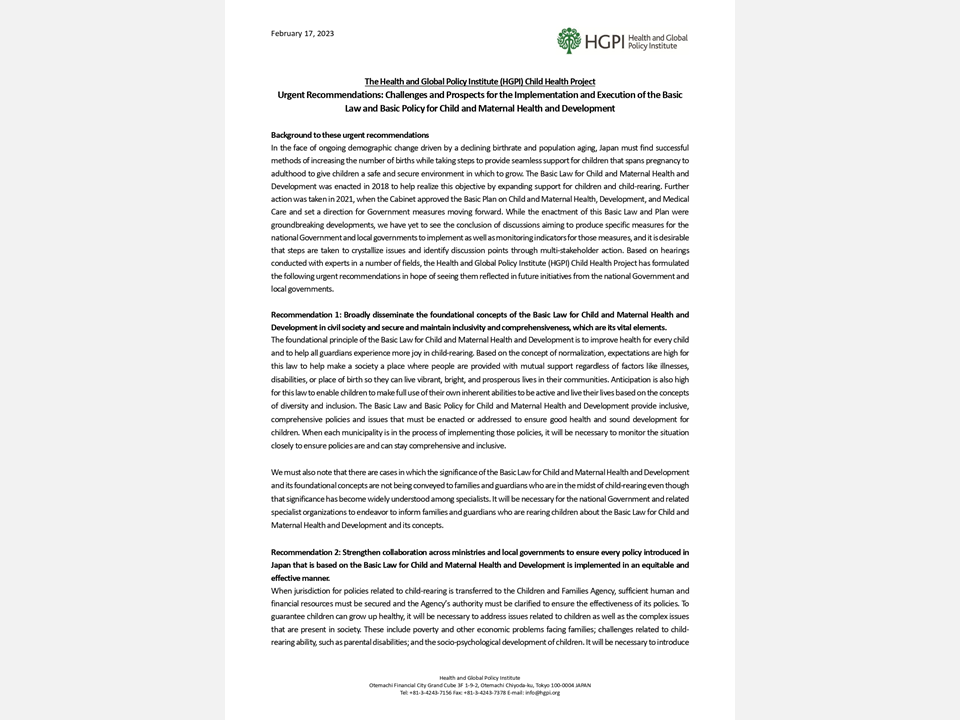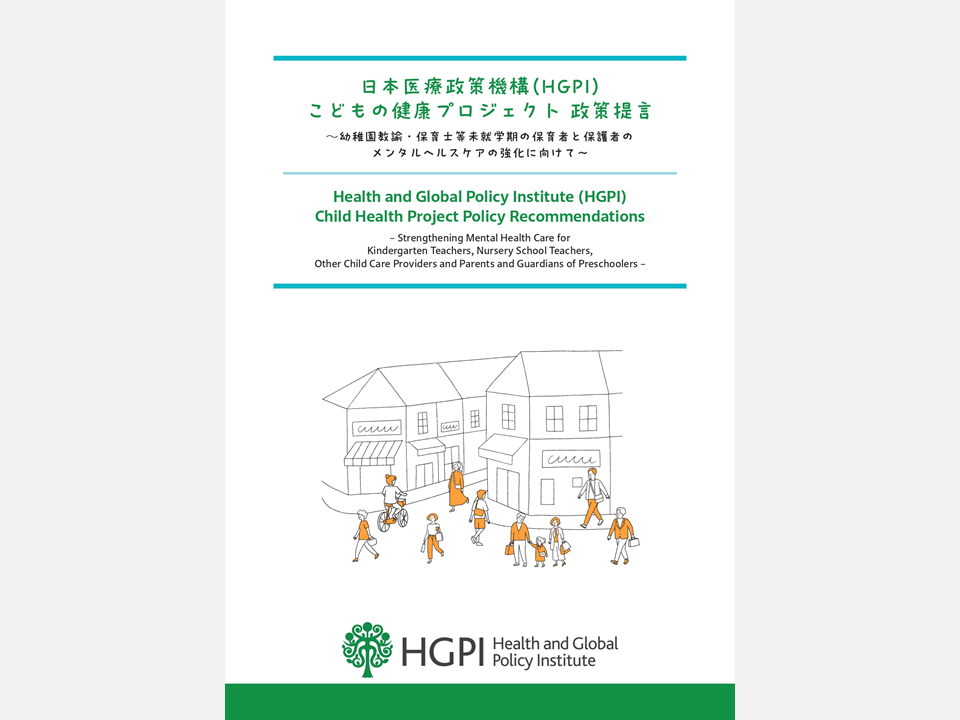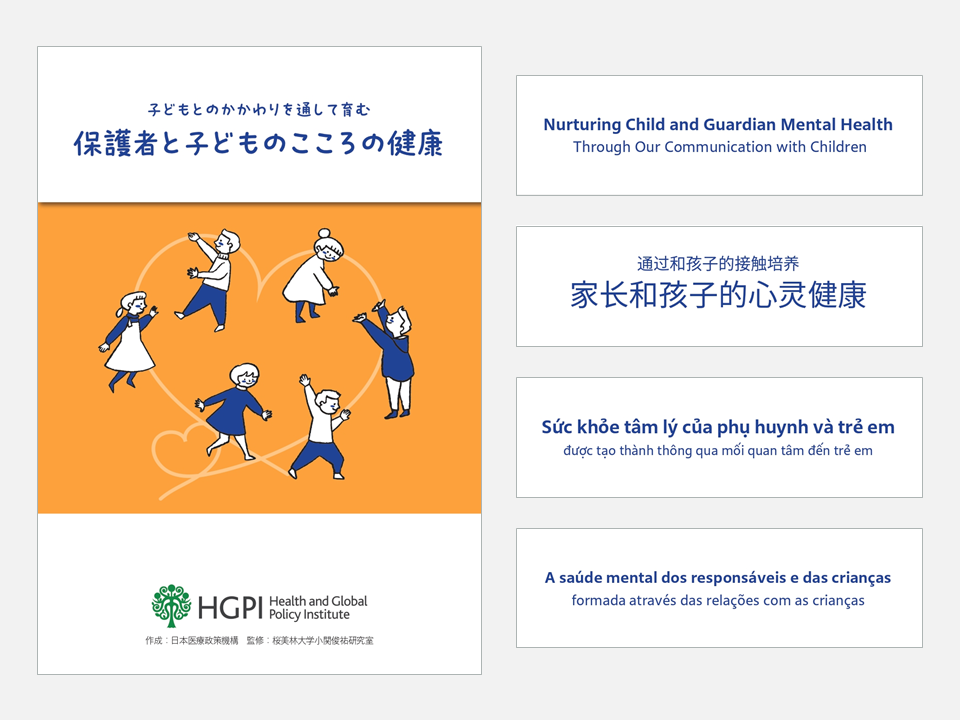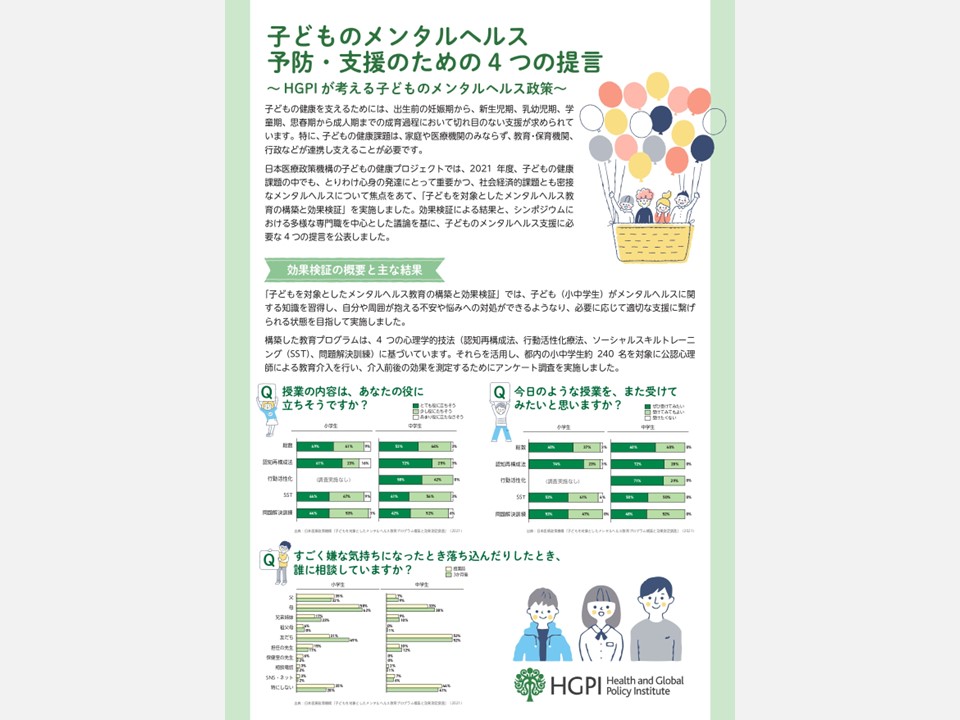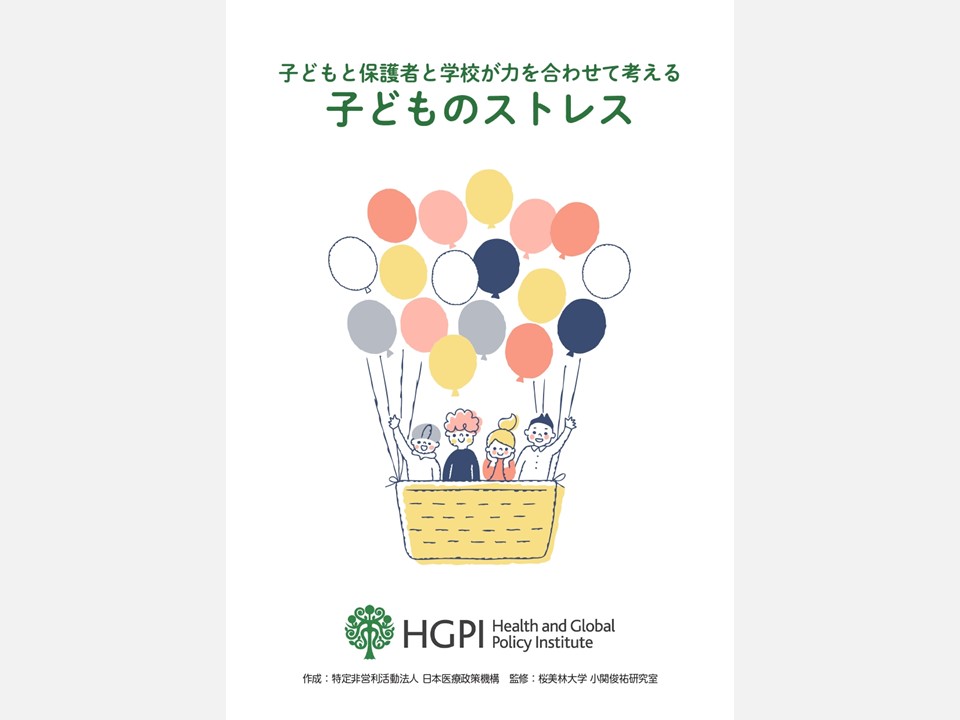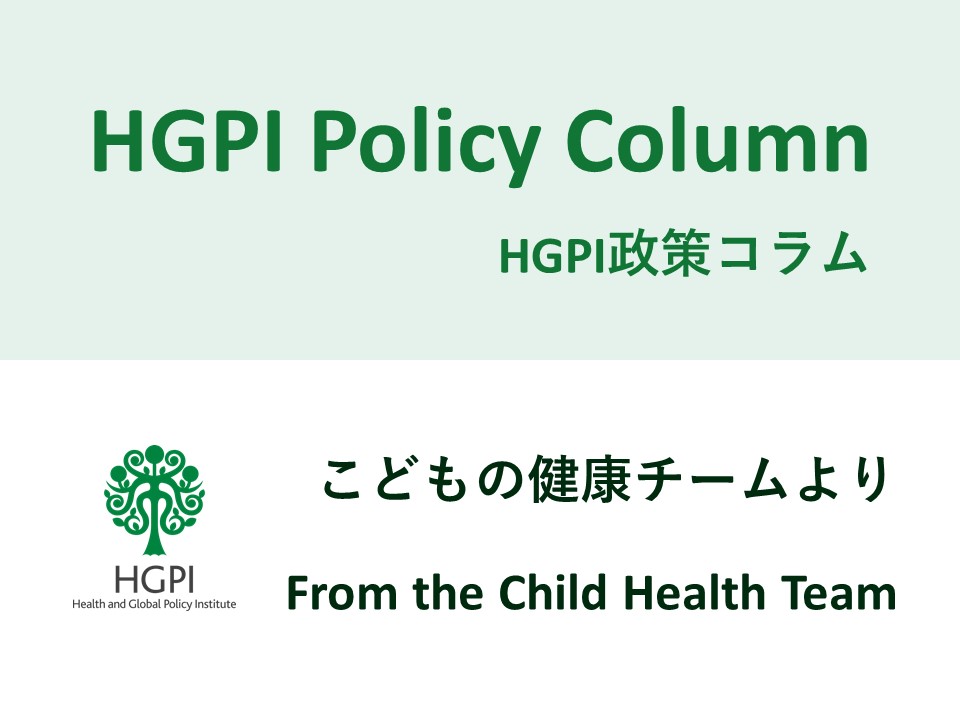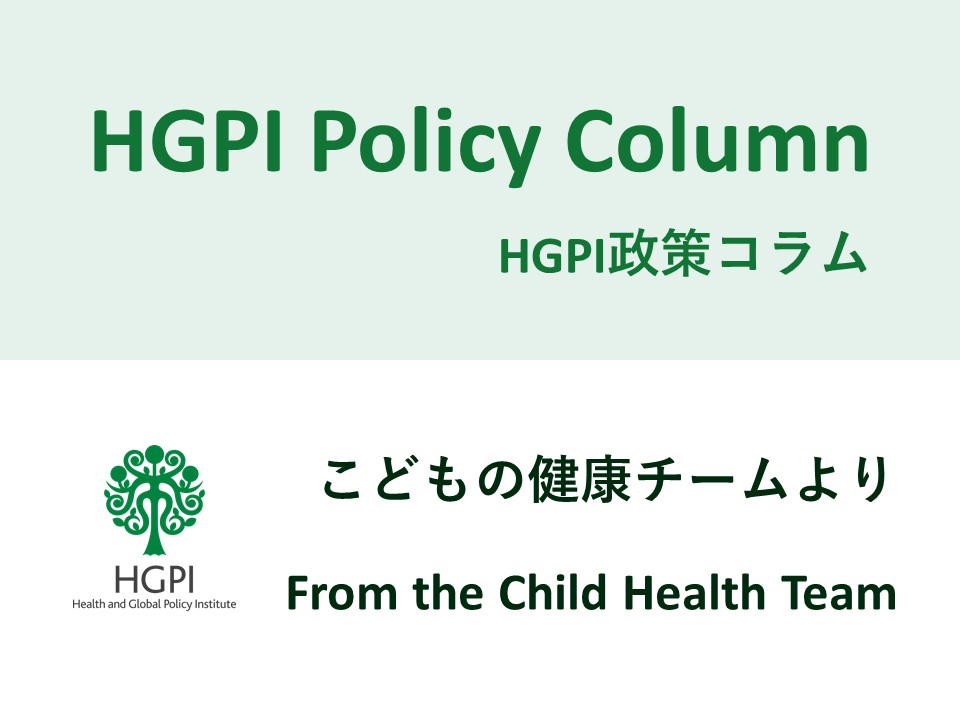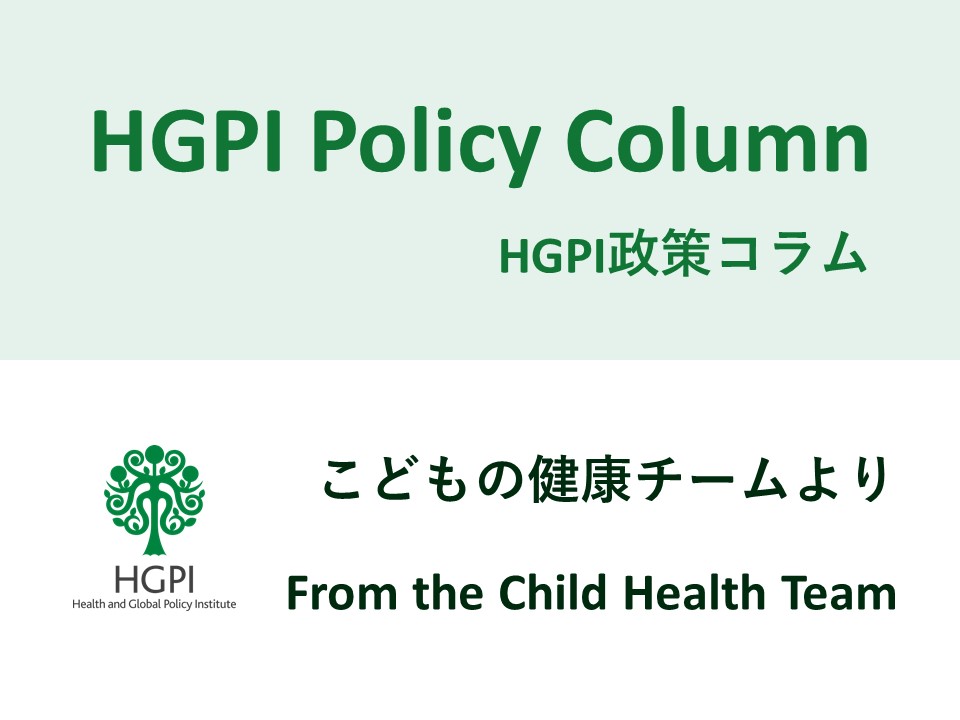[Event Report] The Child Health Project Public Forum “Challenges and Future Prospects for Promoting a Different Dimension of Policies for Children” (April 6, 2023)
date : 4/14/2023
Tags: Child Health
![[Event Report] The Child Health Project Public Forum “Challenges and Future Prospects for Promoting a Different Dimension of Policies for Children” (April 6, 2023)](https://hgpi.org/en/wp-content/uploads/sites/2/ch-20230406-1-P4060440.jpg)
Health and Global Policy Institute (HGPI) has launched the Child Health Project and presented urgent recommendations in February 2023.
To broadly publicize these policy recommendations and intensify discussions on this topic, HGPI hosted a public forum that featured a keynote lecture from Prof. Takashi Igarashi (President and Chief Executive Officer, National Center for Child Health and Development). Prof. Igarashi has worked to advance policies for child health for many years and guided our efforts as a special advisor for HGPI’s Child Health Project. In addition, Dr. Hanako Jimi, a member of the House of Councilors and co-chair of the Children First Study Group on Child and Family Administration, spoke on “Achieving a “Children First” Society”. Dr. Sonoko Sensaki (Assistant Director, Children’s Think Tank Planning and Coordination Office, National Center for Child Health and Development), a former medical technical officer at the Ministry of Health, Labour and Welfare and a specialist in pediatrics, also spoke at the public forum.
<POINTS>
- Child policy is an issue that requires the participation of diverse stakeholders, not limited to those involved in pediatric medicine, to provide comprehensive recommendations and solutions from a societal perspective.
- There have been bottlenecks in the process of implementing policy based on research results, and it is important to increase opportunities for cross-referencing among municipalities (horizontal expansion of good practices). Furthermore, since promoting digital health and developing private businesses to supplement public support is challenging for local governments alone, it is crucial to encourage collaboration among industry, government, academia, and the private sector under the leadership of the national government.
- In 1988, the World Health Organization (WHO) defined “health” as “a state of complete physical, mental and social well-being.” Although Japan ranks first in physical health among the 38 OECD member countries, its psychological health ranks 37th and social health ranks 27th. While Japanese pediatric healthcare has prioritized the improvement of physical health, it is crucial to focus on all three aspects and promote “biopsychosocial” health in the future.
- For instance, given the lack of mechanisms to assess and support children’s mental health and social skills in Japan, it is imperative to establish a system that supports children and families in terms of their biopsychosocial well-being and addresses potential risks through measures such as improved school and individual assessments.
- While the Children and Families Agency aims to provide seamless and comprehensive support that crosses age and institutional barriers, it currently lacks policy areas that follow maternal and child health. To ensure sustainable support, it is necessary to develop “child and adolescent health” and collaborate with school health to promote continuous and comprehensive support.
- In establishing the Children and Families Agency and promoting children’s policies, it is crucial to ensure strong authority and budget allocation under a full-time minister and take the political lead. The concept of “integrated biopsychosocial guarantee” will be shared within the Children and Families Agency, and it is expected to be incorporated into the National Children’s Program Outline, which will be approved by the Cabinet in the fall of 2023. It is of utmost importance to maintain the “integrated” nature of biopsychosocial and to promote understanding so that it is not separated into its physical, psychological, and social aspects in the future.
- The “right of children to express their opinions” stipulated in the Basic Law for Children is a very important right, and from April 1, 2023, national and local governments must be “mandated” to take children’s opinions into account in their policies for children. It is essential to listen to children’s voices, regardless of their age and developmental stage, as well as the views of parents involved in their upbringing.
[Event Overview]
- Date & time: Thursday, April 6, 2023; 16:00-18:00 JST
- Format: Hybrid format (in-person lecture at venue with Zoom webinar)
- Venue: Grand Cube, Otemachi Financial City, Global Business Hub Tokyo (Otemachi Financial City, 1-9-2 Otemachi, Chiyoda-ku, Tokyo)
- Host: Health and Global Policy Institute (HGPI)
- Language: Japanese
- Participation fee: Free
- Capacity: Venue: 30 people, Online: 200 people
[Program] (titles omitted; in no particular order)
16:00-16:20 Opening remarks and explanatory introduction: An Introduction of HGPI’s Urgent Recommendations
Ryoji Noritake (Board Member and CEO, HGPI)
16:20-16:30 Next Steps for Implementing and Applying the Basic Law and Basic Plan for Child Health Based on the Urgent Recommendations
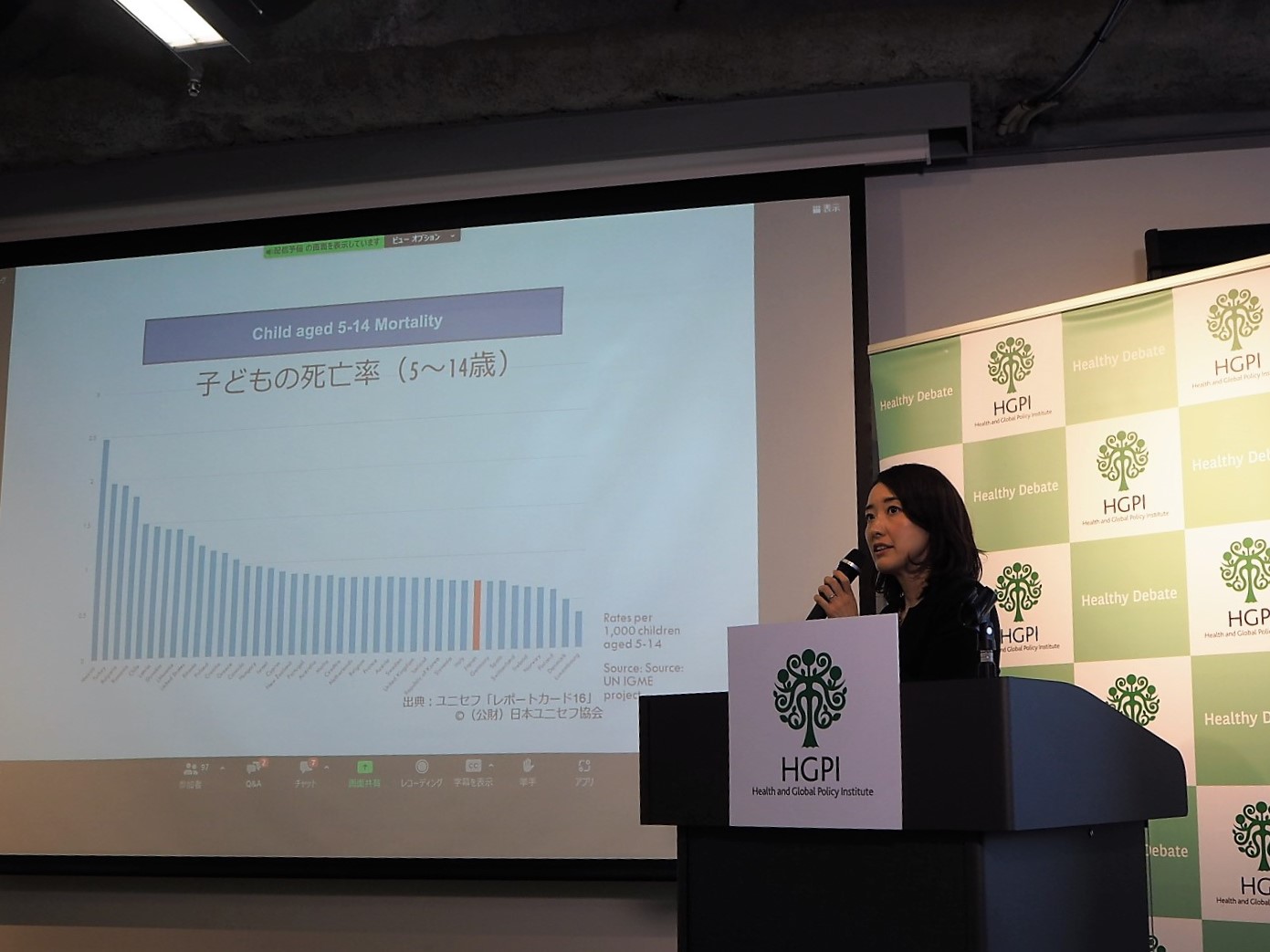 Sonoko Sensaki (Assistant Director, Children’s Think Tank Planning and Coordination Office, National Center for Child Health and Development)
Sonoko Sensaki (Assistant Director, Children’s Think Tank Planning and Coordination Office, National Center for Child Health and Development)
16:35-17:20 Keynote lecture 1: Viewpoints on the Promotion of a Different Dimension of Policies for Children in the Future
Ta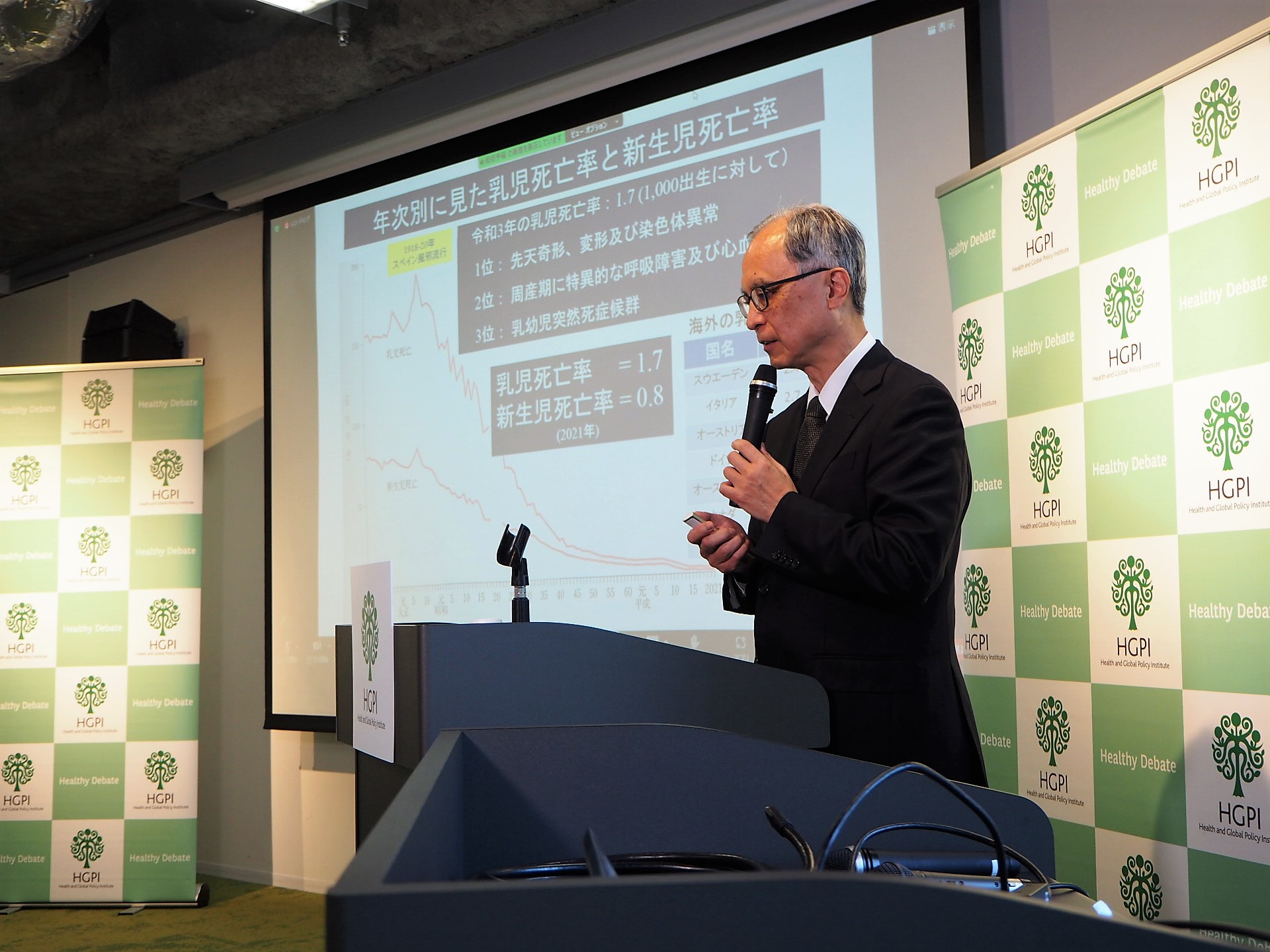 ashi Igarashi (President and Chief Executive Officer, National Center for Child Health and Development)
ashi Igarashi (President and Chief Executive Officer, National Center for Child Health and Development)
17:25-17:45 Keynote lecture 2: Achieving a “Children First” Society
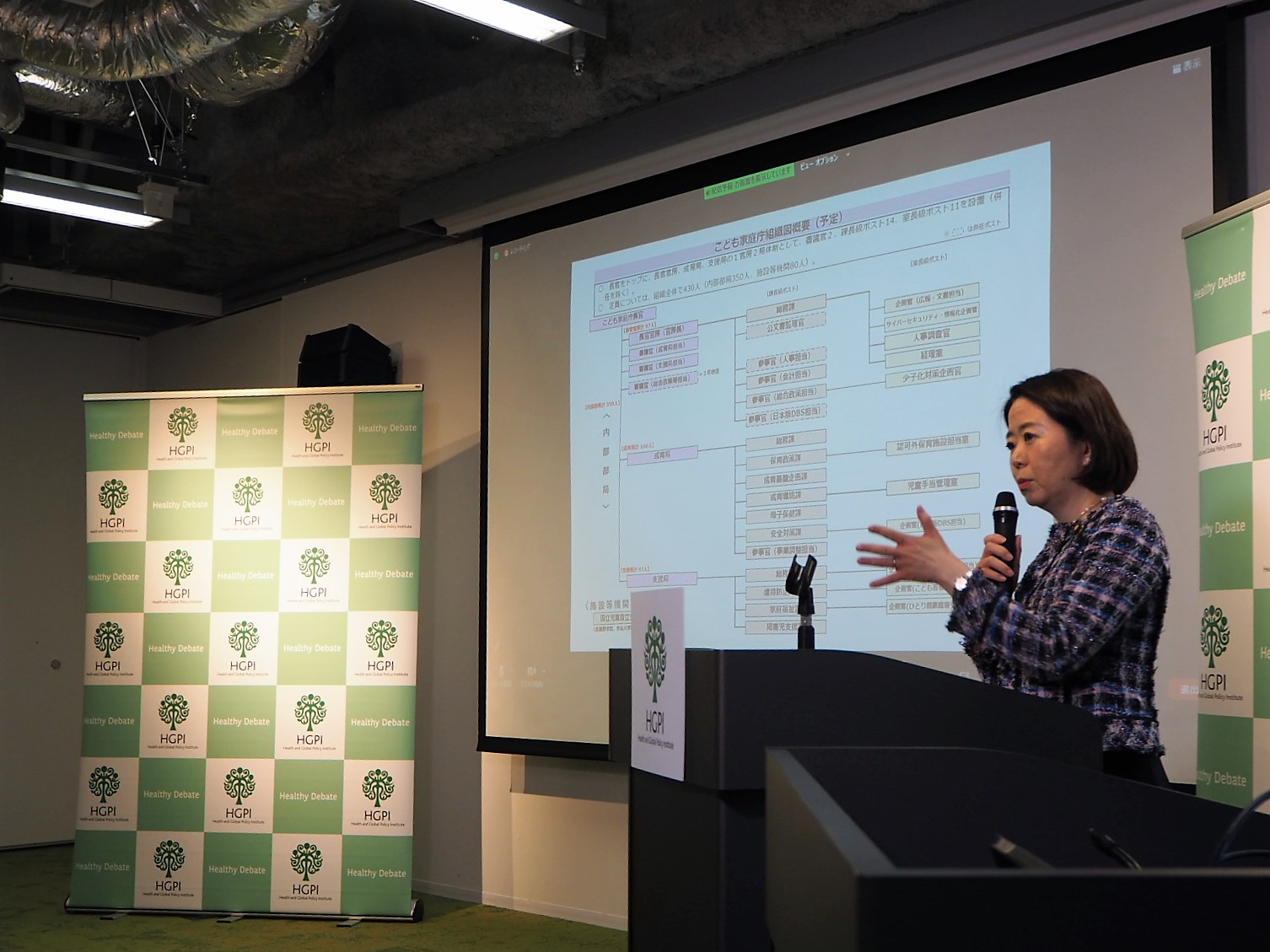 Hanako Jimi (Member, House of Councilors)
Hanako Jimi (Member, House of Councilors)
17:50-18:00 Closing remarks
Kiyoshi Kurokawa (Chairman, HGPI)
■ Speaker’s Profile
Takashi Igarashi (President, National Center for Child Health and Development)
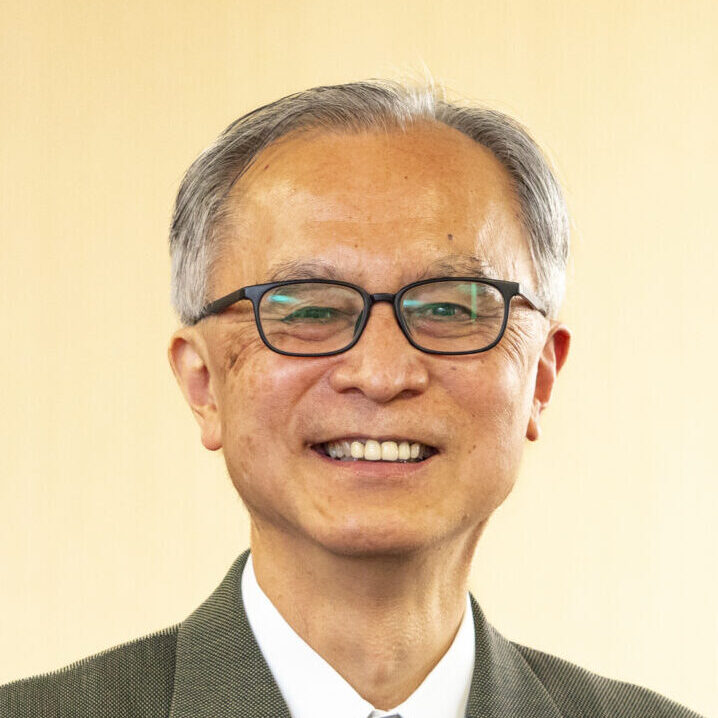 Dr. Igarashi graduated Faculty of Medicine, The University of Tokyo in 1978. After completing the training of general Pediatrics, he received Pediatric Nephrology training at Kiyose Metropolitan Children’s Hospital and at Pediatrics, The University of Tokyo. He studied immunology and molecular biology at Division of Immunology, Boston Children’s Hospital. He got Ph.D. degree of The University of Tokyo in 1989. He received seven prizes in several different medical societies. He was a chairman and professor of Pediatrics, The University of Tokyo. He worked as a Vice President of The University of Tokyo Hospital for 7 years. Now, he is a professor emeritus of The University of Tokyo. He was a member of Science Council of Japan, the president of Japan Pediatric Society, the councilor of Japanese Society of Nephrology and the president of Japanese Society of Pediatric Nephrology.
Dr. Igarashi graduated Faculty of Medicine, The University of Tokyo in 1978. After completing the training of general Pediatrics, he received Pediatric Nephrology training at Kiyose Metropolitan Children’s Hospital and at Pediatrics, The University of Tokyo. He studied immunology and molecular biology at Division of Immunology, Boston Children’s Hospital. He got Ph.D. degree of The University of Tokyo in 1989. He received seven prizes in several different medical societies. He was a chairman and professor of Pediatrics, The University of Tokyo. He worked as a Vice President of The University of Tokyo Hospital for 7 years. Now, he is a professor emeritus of The University of Tokyo. He was a member of Science Council of Japan, the president of Japan Pediatric Society, the councilor of Japanese Society of Nephrology and the president of Japanese Society of Pediatric Nephrology.
He is now an honorable member of American Pediatric Society, the president of Japan Children’s Environment Association. He is the president of National Center for Child Health and Development in Tokyo.
Hanako Jimi (Member, House of Councilors)
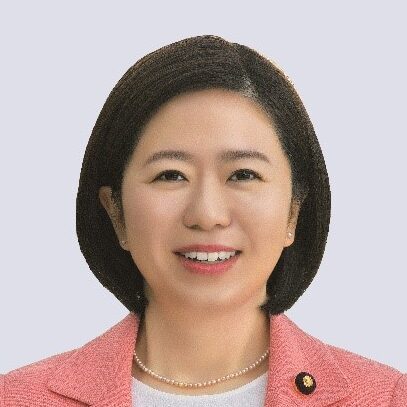 Dr. Jimi was born in Sasebo City, Nagasaki Prefecture and raised in Kitakyushu City. She graduated from the College of International Relations at the University of Tsukuba Third Cluster of Colleges in 1998 and graduated from the Department of Medicine at Tokai University School of Medicine in 2004.She is a pediatrician and an associate professor at Tokai University School of Medicine. After working in the Departments of Pediatrics at University of Tokyo Hospital, Ome City Municipal General Hospital, and Toranomon Hospital, she was elected to the Japanese House of Councilors national proportional representation block for the first time in 2016. She has served as acting director of the Liberal Democratic Party’s Women’s Affairs Division and Parliamentary Vice-Minister of Health, Labour and Welfare since September 2019. She currently serves as board member of the House of Councilors Committee on Health, Welfare and Labour, as vice-chairperson of the Health, Labour and Welfare Committee, Chief of Secretariat of Anti-COVID-19 Measures for Inbound Tourists at Head Office for Anti-COVID-19 Measures Committee of the Liberal Democratic Party’s Policy Research Council and director of the Liberal Democratic Party’s Women’s Affairs Division.
Dr. Jimi was born in Sasebo City, Nagasaki Prefecture and raised in Kitakyushu City. She graduated from the College of International Relations at the University of Tsukuba Third Cluster of Colleges in 1998 and graduated from the Department of Medicine at Tokai University School of Medicine in 2004.She is a pediatrician and an associate professor at Tokai University School of Medicine. After working in the Departments of Pediatrics at University of Tokyo Hospital, Ome City Municipal General Hospital, and Toranomon Hospital, she was elected to the Japanese House of Councilors national proportional representation block for the first time in 2016. She has served as acting director of the Liberal Democratic Party’s Women’s Affairs Division and Parliamentary Vice-Minister of Health, Labour and Welfare since September 2019. She currently serves as board member of the House of Councilors Committee on Health, Welfare and Labour, as vice-chairperson of the Health, Labour and Welfare Committee, Chief of Secretariat of Anti-COVID-19 Measures for Inbound Tourists at Head Office for Anti-COVID-19 Measures Committee of the Liberal Democratic Party’s Policy Research Council and director of the Liberal Democratic Party’s Women’s Affairs Division.
Sonoko Sensaki (Deputy head, Think-tank for Children and Family, National Center for Child Health and Development, / Consultant doctor, Department of Psychosocial Medicine)
 In 2009, Dr. Sensaki graduated from the Faculty of Medicine at Chiba University. She completed an early residency at National Tokyo Medical Center and a later residency in Pediatrics at the National Center for Child Health and Development, and worked in the Child and Adolescent Psychiatry Department at the Tokyo Metropolitan Children’s Medical Center. Dr. Sensaki obtained a Master of Public Health degree from the Hong Kong University and engaged in epidemiological research and pediatric developmental clinical work at institutions such as the National University Hospital Singapore. In 2019, she participated in the implementation of the Act on Promoting Childcare Support by joining the Ministry of Health, Labour and Welfare. From 2020, she served as Deputy director, Maternal and Child Health Division, Child and Family Policy Bureau, responsible for planning, researching, and implementing childcare-related policies. In 2021, she worked as Deputy Director of Environment Risk Assessment Office, Environmental Health Department, Ministry of the Environment, and led the Eco-Child Study (a national survey on children’s health and the environment). From August of the same year, she assumed the current position. In 2022, she joined the “Think-tank for Children and Family” project and is currently working to promote evidence-based policy proposals and social implementation to advance evidence-based policy making.
In 2009, Dr. Sensaki graduated from the Faculty of Medicine at Chiba University. She completed an early residency at National Tokyo Medical Center and a later residency in Pediatrics at the National Center for Child Health and Development, and worked in the Child and Adolescent Psychiatry Department at the Tokyo Metropolitan Children’s Medical Center. Dr. Sensaki obtained a Master of Public Health degree from the Hong Kong University and engaged in epidemiological research and pediatric developmental clinical work at institutions such as the National University Hospital Singapore. In 2019, she participated in the implementation of the Act on Promoting Childcare Support by joining the Ministry of Health, Labour and Welfare. From 2020, she served as Deputy director, Maternal and Child Health Division, Child and Family Policy Bureau, responsible for planning, researching, and implementing childcare-related policies. In 2021, she worked as Deputy Director of Environment Risk Assessment Office, Environmental Health Department, Ministry of the Environment, and led the Eco-Child Study (a national survey on children’s health and the environment). From August of the same year, she assumed the current position. In 2022, she joined the “Think-tank for Children and Family” project and is currently working to promote evidence-based policy proposals and social implementation to advance evidence-based policy making.
Top Research & Recommendations Posts
- [Policy Recommendations] The Path to a Sustainable Healthcare System: Three Key Objectives for Public Deliberation (January 22, 2026)
- [Research Report] The 2025 Public Opinion Survey on Healthcare in Japan (March 17, 2025)
- [Research Report] Perceptions, Knowledge, Actions and Perspectives of Healthcare Organizations in Japan in Relation to Climate Change and Health: A Cross-Sectional Study (November 13, 2025)
- [Policy Recommendations] Reshaping Japan’s Immunization Policy for Life Course Coverage and Vaccine Equity: Challenges and Prospects for an Era of Prevention and Health Promotion (April 25, 2025)
- [Research Report] The 2023 Public Opinion Survey on Satisfaction in Healthcare in Japan and Healthcare Applications of Generative AI (January 11, 2024)
- [Research Report] AMR Policy Update #4: Cancer Care and AMR (Part 1)
- [Public Comment Submission] “Assessment Report on Climate Change Impacts in Japan (Draft Overview)” (December 24, 2025)
- [Policy Recommendations] Developing a National Health and Climate Strategy for Japan (June 26, 2024)
- [Research Report] The Public Opinion Survey on Child-Rearing in Modern Japan (Final Report) (March 4, 2022)
- [Research Report] Survey of Japanese Physicians Regarding Climate Change and Health (December 3, 2023)
Featured Posts
-
2026-01-09
[Registration Open] (Hybrid Format) Dementia Project FY2025 Initiative Concluding Symposium “The Future of Dementia Policy Surrounding Families and Others Who Care for People with Dementia” (March 9, 2026)
![[Registration Open] (Hybrid Format) Dementia Project FY2025 Initiative Concluding Symposium “The Future of Dementia Policy Surrounding Families and Others Who Care for People with Dementia” (March 9, 2026)](https://hgpi.org/en/wp-content/uploads/sites/2/dementia-20260309-top.png)
-
2026-02-05
[Registration Open] (Webinar) The 141st HGPI Seminar “Current Status and Future Prospects of Korea’s Obesity Policy: Voices of People with Lived Experience in Policy Promotion” (March 3, 2026)
![[Registration Open] (Webinar) The 141st HGPI Seminar “Current Status and Future Prospects of Korea’s Obesity Policy: Voices of People with Lived Experience in Policy Promotion” (March 3, 2026)](https://hgpi.org/en/wp-content/uploads/sites/2/hs141-top-1.png)
-
2026-02-06
[Research Report] AMR Policy Update #5: Cancer Care and AMR (Part 2)
![[Research Report] AMR Policy Update #5: Cancer Care and AMR (Part 2)](https://hgpi.org/en/wp-content/uploads/sites/2/HGPI_20260204_AMR-Policy-Update-5.png)




